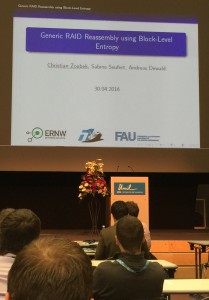As mentioned in my last blogpost, I had the pleasure to participate in this years DFRWS USA and present our paper. The paper and presentation can be freely viewed and downloaded here or here. Note that there is also an extended version of the paper, which can be downloaded here.
The keepassx, zsh and heap analysis plugins are now also part of the Rekall release candidate 1.7.0RC1, so it’s easier to get started.
The conference had some great talks and workshops, which I’m going to briefly sum up.
Continue reading “DFRWS USA 2017”
